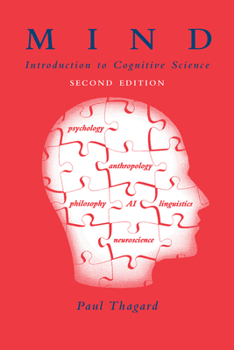Mind, second edition: Introduction to Cognitive Science
Select Format
Select Condition 
Book Overview
Thagard's systematic descriptions and evaluations of the main theories of mental representation advanced by cognitive scientists allow students to see that there are many complementary approaches to the investigation of mind. The fundamental theoretical perspectives he describes include logic, rules, concepts, analogies, images, and connections (artificial neural networks). The discussion of these theories provides an integrated view of the different achievements of the various fields of cognitive science.
This second edition includes substantial revision and new material. Part I, which presents the different theoretical approaches, has been updated in light of recent work the field. Part II, which treats extensions to cognitive science, has been thoroughly revised, with new chapters added on brains, emotions, and consciousness. Other additions include a list of relevant Web sites at the end of each chapter and a glossary at the end of the book. As in the first edition, each chapter concludes with a summary and suggestions for further reading.






